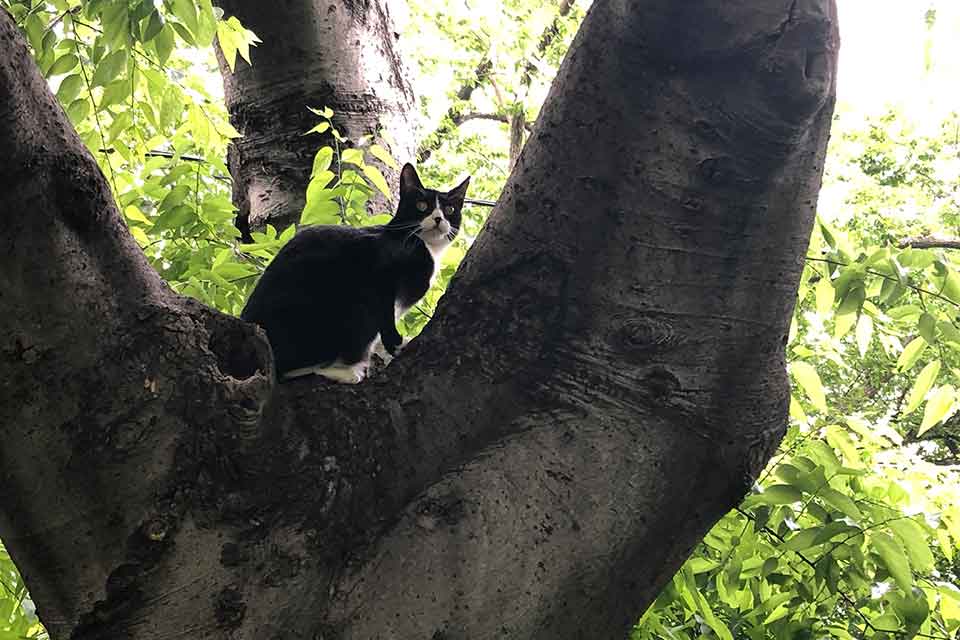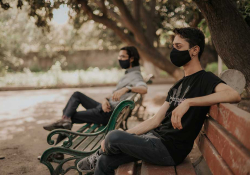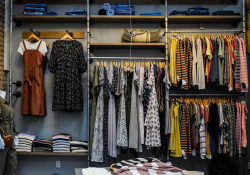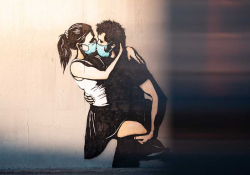Into Our Wild Place

Watching Buffy the Vampire Slayer and spending time in her backyard—a “precious contained universe, teeming with life”—a writer ponders whether we’ll emerge from the current pandemic with a paradigm shift.
The sound of the pandemic in suburban Texas is lawn mowers. The baritone clip of a rough patch. The ping of a stray branch. From the wild quarter acre of my backyard, the buzz layers: a yard away, three yards away, six, in every direction. This is the hum of people creating order. The sound of carrying on.
I can’t make up my mind about the backyard so have done nothing with it. While I do keep the front clipped according to the unspoken rules of suburban lawncare, the backyard, unseen and private, is covered in dead branches of all sizes that lay where they’ve fallen. Ivy overgrows a rusted dog run. Carcasses of burned logs clutter one corner. Low power lines swing along the diagonal. There’s also a beauty, the way the wind sweeps the feathered tops of knee-high grass in eddies like an ocean. Bees, a breath from extinct, dip into dandelion blooms.
Perhaps I long for the contained wilderness of an English garden. Of careful stonework walling in curated butterfly grasses. Climbing roses to weave through the chain-link fence. Like the Denver Botanical Gardens, with the arch of red roses wild and small. Where F and I leaned against each other in a gazebo, a picnic of white wine, cedar-planked salmon, boiled potatoes in olive oil and Italian parsley, heirloom black beauties flaked with sea salt. Him saying flavor can kick you awake. Me asking have we ever been so alive? His finger tracing my arm. Explosions of ornamental grass sway, amber tips feather into gold.
Memories of F aren’t particularly useful these days, and I have no idea where in the yard to start. The dismantled picket fence that rots beneath an impossibly tall black walnut tree? The pile of leaves, branches, and stray bits of yellow nylon rope inside the dog run?
It’s a big job to do alone, my neighbor says from over the half-sized chain-link fence. She means this as commiseration. We stand, six feet apart, and shake our heads at a half-dead branch hanging in the canopy of Texas ash so tall it must have been planted when the house was built in 1949.
I wasn’t supposed to buy my first house alone, yet I did, eight months ago. But I don’t tell her this. There are no signs left of F, so she doesn’t know he existed—he did leave socks, but in a childish fit after the breakup I tossed them on the pulsing coals of my minigrill. Nylon does not burn cleanly. If I tell her about him, then I become the kind of person who’s stuck. I’m not stuck. I’ve just crashed my whole life in that precise way that turns socially distanced six feet into a gulf, and nothing makes sense, except that I’m not really alone. The whole world is sort of going through this right now. Home with grass that grows a bit too quickly.
I’ve just crashed my whole life in that precise way that turns socially distanced six feet into a gulf.
In the years since my house was built, human populations doubled and three hundred new infectious diseases attacked—Covid-19, SARS, the swine flu, H1N1. We don’t yet know what caused the latest outbreak, but we do know that over 70 percent of the diseases born in the last century come from wildlife in rainforests and mountains and other secret places. We invaded each wilderness to cure disease, to extend our lives with the bloom of technology, to fuel progress, to feed the starving, to know the deepest secrets of our one, precious home. And yet in Brooklyn an EMT with a voice like nails says she’s responded to thirty-seven cardiac arrests this week. More than she responded to in all of 2019. She’s not a crier, she says, but she thinks this would make her cry, if she had enough time between calls to process what she’s seen.
I don’t think we’re exactly culpable for our own destruction, but we’re not blameless either.
* * *
Inside the first house I’ve bought, alone, I’ve refinished the floors, lifted the foundation, filled over fifty tiny nail holes left by a former tenant along the perimeter of one window (OCD, amphetamines, string lights?). I live with three cats, and we spend most nights under a faux fur blanket on the couch streaming hours of Netflix. Last night was Buffy the Vampire Slayer. Billy Idol lookalike Spike held the emotionally unavailable slaying badass while she slept. In the morning he wouldn’t look at her. Said he’s terrified, said it was the best night of his two hundred years (vampire), said he’d never experienced something more beautiful, said he was afraid she’d say she didn’t feel something too.
In prequarantine life, I would leave the room at this sappiness. Or, if I were watching with F, I’d stick a finger in my mouth, make fake gagging sounds, and wait for him to roll his eyes. He preferred spaghetti westerns, six-minute single-camera shots between the unemotive eyes of two men, white hat and black, bent on killing each other, then taming the West. I like zombies, apocalypse, sometimes highbrow art-house horror. Maybe that was our problem. We lived in different paradigms.
Thomas Kuhn argued paradigm shifts are fundamental to social revolution. Paradigms function like society-wide blinders. We build more farms, encroach into wilderness, drill more oil, frack the earth because we’re living under a paradigm that tells us we aren’t safe enough, we don’t possess enough in this wild wild West. For a paradigm to shift, the old one must no longer be able to explain new phenomena. The day in science when rubbing snake slurry over plague boils (fourteenth century) no longer made as much sense as bloodletting (seventeenth century), paradigms so distant in our world of coordinated social distancing and respirators it’s next to impossible to imagine seeing through the old lenses. We’re at the start of a paradigm shift. The old methods for taming and extracting the wild are pushing us toward an extinction event. We need a better paradigm. We don’t have the three hundred years it’s traditionally taken us to make the shift.
We need a better paradigm. We don’t have the three hundred years it’s traditionally taken us to make the shift.
In later episodes, Buffy’s town of Sunnydale is overrun by a misogynistic preacher and his women-mutilating mutant army, then by a plague of male vampires, as corroded on the outside as within. The arc for each monster is the same: kill every last human, claim every inch of land for hell. Sunnydale becomes so far gone Buffy can’t resort to her usual aerial flipping, zinger-punctuated rescue. She’s forced to choose between drilling deeper into her power source to become individually stronger or to diffuse her slayer legacy to all women capable of answering the call. She picks the latter. Sunnydale eats itself into a crater. Thousands of girls became badass slayers. A collective ecofeminist reclaiming of the earth, the friend who turned me on to Buffy argues.
The ending is so impossible I drink a bottle of wine. I’m not usually a big drinker. It makes me feel worse. Turns out I don’t do so well alone.
* * *
In the morning the Siamese decides sleeping until eight is a howlable offence. My breath is vinegar and my veins have turned to dust. Kia belts out another hollow mewl. I hate to be the kind of human who disappoints her. I get up, grab her cheeks, where the chocolate of her nose and ears fade into light fawn, this chiaroscuro girl, and kiss her on the tip of her nose. She tolerates the kiss in a pedantic sort of way—her soulful blue eyes tell me: I hate when you do that. Tell me: there’s a squirrel who’s been running on the roof all morning. Tell me: hey, human, let’s go.
The other two join us in the kitchen—the sweetly insane orange-and-white bobtail, Max, and the shy tuxedo baby. I call her Simone. After Nina. After de Beauvoir. She reminds me that the strongest among us had to crash before she forged herself into something new.
I stir honey and almond milk into a mug of Earl Grey and stand over the three of them while they eat peaceably together, lapping shredded chicken stew with their pink tongues.
I wonder if the cats are depressed with their indoor-only existence.
Later in the day, Simone lunges at a palm tree in a pot until it is uprooted, potting soil scattered across the refinished oak planks of the living room floor. Kia forlornly puts her head on her paws as she watches two squirrels circling a tree in a game of chase. I wonder if the cats are depressed with their indoor-only existence. I miss F. I think I’ve become too greedy with them, keeping them locked inside. I worry about cars, dogs, heartworm-spreading mosquitos. I also worry about wildlife. Scientists attribute the extinction of sixty-three bird species to outdoor domestic cats. I also want my cats to have a life worth living. It’s a real conundrum.
St. Thomas Aquinas held animals to be here for human comfort. He, like Aristotle before him, believed in hierarchies based on human attributes, reason, and complex emotion to their minds. The reasoned beings—humans—should rule. Complex emotions evinced a soul, a worth, unique to men (debate raged on for hundreds of years as to whether women had souls). Neither philosopher had access to studies that show wild boars send emissaries to neighboring boar colonies when a new threat has entered the territory. They warn herds they’ve never interacted with before, at risk to themselves. Or that octopi have a sense of self enough to understand how mirrors work and enough reason to work through rather complicated underwater mazes. Or that a mountain lion on the Olympic peninsula regularly shares his dinner with a skunk.
Cats have inner lives, of this I’m certain, and while they are great comforts, they are not here for my comfort. Of course, there are still the birds. Cardinals. Blue jays. A mourning dove who nests in the tree near my writing desk. As a compromise between the birds and cats I settle on a supervised trip where the cats are free except to kill, so I promise, and where nothing can get them, so I tell myself.
Max—the bobtail—takes off first. He is a rocket of white as he does a lap around the yard. He’s too fast to turn where the fence meets at a corner, so he banks off a tree trunk without losing speed, then disappears and the long grass sways violently. He is the leader. The type to act first, think later. I found him stuck up a tree, no more than seven weeks old, alone, dehydrated, and mewing pathetically from a branch far higher than the second-story window of the apartment I used to live in.
The Max-tree incident happened three months into the first time I lived alone, after I left F at his Nashville law school while I moved to Florida to start a graduate program. F was going to finish his last year, then follow me. We’d been talking about kids, about buying a house, plans that we’d had for ten years and were about to become real. Somewhere in this time I let his calls go to voice mail.
We’d been talking about kids, about buying a house, plans that we’d had for ten years and were about to become real. Somewhere in this time I let his calls go to voice mail.
In our early years, I’d pick fights the week before our anniversary, until he recognized the pattern and pointed it out. I stopped with the anniversaries, but then did the same dance in a different room. How can you know something like this about yourself and keep screwing up in the same way? I remember the day he called, said, you’re individualistic in a way I’m not, you’re okay on your own. I should have told him that wasn’t me at all. Instead I ranted about a to-do list, longing for him to remind me what I wanted to know, that we’d get through this time apart, together. Instead I described the accumulation of white Max hairs in the corners and the pressing need to get off the phone and vacuum.
I don’t do so well alone. Though I don’t always do so well with people I love, either.
Max wraps his arms and legs around the thick trunk of a Texas ash and begins to climb. The tree is tall enough that if he fell, he might not land on his feet. But he is confident, strong, not a kitten anymore. More alive than he’s been in days. I let him climb.
Simone has found a broken snake egg. She edges it with her white nose dipped at the tip in ink. At least I think it’s a snake egg on account of the coiled, slimy gray-brown baby snake I see hiding beneath a nearby bed of clover. The mother snake is close, sleek, and black with a green racing stripe highlighting her coils. I stand between Simone and the snakes, try to block her view. I know keeping my cats from killing is an absurd desire. I know their nature. But nothing is natural about this new world, humans and our beloved beasts encroaching, snakes and birds and wild things dying. I don’t know what else to do but keep her from killing the snake, so that’s what I do. Oblivious, Simone pushes the cherry tomato–sized egg with her nose. Holding her mouth open, her eyes roll back into her head, bliss.
But nothing is natural about this new world, humans and our beloved beasts encroaching, snakes and birds and wild things dying.
A different neighbor offers to mow the lawn. I wonder what he sees when he looks at the tall grasses, the broken branches, this thirtysomething woman so often alone even before the stay-at-home orders hit. I decline, tell him I have a lawn mower (I do) and that I’ll get around to it eventually (I might). The bees love the clover, and there really aren’t very many of them left. Scientists say that if we all mowed our lawns once every two weeks instead of every week, local bee populations would increase by 30 percent. Humans who think like St. Thomas Aquinas have done so much harm; irrevocable, most scientists agree.
I want this small backyard to be different.
I want to be different.
Kia is following Max’s racetrack. She bounds delicately instead of rockets. She is cross-eyed and clumsy—the kind of cat to trip while jumping a foot onto a couch—and has learned to be slow and purposeful in her movements. Overhead, two intertwined branches creak and the leaves shimmer. In the tall grasses her head bounces up and then she disappears.
Max jumps eight feet down from the tree he’s climbed, licks his back leg as if it stings, and then is off again, racing in circles around the yard. He finds a log and walks along it as if it’s a tightrope, one white paw at a time. He checks to see if I’m watching. I am. He struts.
Simone investigates a pile of firewood. She’s tracking a scent. She wedges her head into the logs, mindless of spiders or snakes or other biting things in the crevice.
Simone is tough. She showed up in the parking lot of my old condo five weeks old, eyes newly turned green from infant blue, a claw mark gushing down the center of her face, anemic from flea bites, and shivering despite the relentless Florida heat. Yet when I spoke to her, she followed me inside. She curls with Kia for baths. Sleeps in the crook of my knee. Before the pandemic, she was starting to come out to greet visitors. A trusting, big-hearted girl.
I crouch in the clover, a good distance from the snakes, and watch as a black beetle with a white dab on its back climbs an overpass of dead grasses. I’m absorbed in this miniature landscape. A sticky weed with green pinhead burrs and leaves like starfish catches my pant leg, and I brush it off. Scree, scree, calls an unseen bird. A spray of lavender flowers the size of baby’s breath poke out of the clover, and a bee emerges. This precious contained universe, teeming with life.
This precious contained universe, teeming with life.
Then I hear Simone. She is alarmed and her cries are sharp. She is in the same tree Max was in, a squirrel angrily barking overhead. Unlike Max, who’s learned to stop before he gets too high, Simone kept going. She clings to a V between the trunk and a branch at least twenty feet above the power lines, which are level with the roof. Thirty-five, forty feet total, I guestimate. The next branch is too far below and the trunk between is a straight vertical drop. Simone looks into my eyes and mews, quiet, pleading.
Kia and Max come to stand under the tree and look between Simone and me. They smell fear. They can’t tell which of us is in more danger.
I turn to Max. Angrily tell him it’s all his fault. It’s mean and unfair and I’m glad he doesn’t speak English. He puts his ears back in an obsequious sort of way. I worry he understands more than I give him credit for. Simone’s back legs are splayed like a frog’s, the branch flattens her belly. She stretches her front paws as far as they will go down the vertical drop. Her eyes go wide. She retreats, mewing sharply. She stares at me, waits. Wind chimes run their circled tones.
I suddenly can’t bear the need in her eyes, how utterly useless I am, her desperation is wide and deep and dark like space and there is a hollowness growing in me, a swirl of F, the first day we knew we’d be together, on a college bus telling each other our lives, the time we ate oversized sushi, laughing to see who could close their lips over the entire roll, or when he held me and said I wasn’t messed up, not like I thought, I was strong and smart and whole, and other lost moments, too many to name, that without realizing it, I’ve turned into dark matter, sucking more loss with every evolution, expanding, darkly, heavily. I am the last bee landing on a blade of grass, in a wasteland of flowerless lawn. I am the cry of the last wild thing, exposed with no more secret places to hide. I’m hollow, so heavy, so useless. I lean against the tree, stretch my arms up toward Simone. Then I shake my head and say aloud, like a crazy person, get a grip.
Simone is brave, braver than Max was when he was stuck up a tree. She’s already lived through worse. My Nina, my de Beauvoir. I bring a three-step ladder, which has to be half on a root to get close enough to the trunk. The ladder shakes with each move. With my arms extended as far as I can, I pat the trunk and coax her. You can do it, you are strong, you’ve got this, I say. She slips twice, falls a foot each time, with her ears back and eyes wide and frantic. I stay calm. She keeps going. When my fingertips can brush her, I stand on my tiptoes, grab her by her belly, and pull. She won’t let go with her front paws. We stand like that—me on my tiptoes on a three-step ladder, which shakes, holding the white belly of a cat who’s horizontal to the tree, her front claws hooked into the trunk for dear life.
I hold her tighter. She lets go.
Once on the ground, she winds between my legs, purring, and looking at me with half-closed, emerald eyes. The look of gratitude. Then she’s off, chasing Kia through the long grasses, both bounding like antelope, stalks bend and brush their bellies. Now Kia chases Simone. Max joins the fray with far too much enthusiasm. The girls scatter.
On future backyard trips, I will use a saw to cut up the rotting picket fence into trash-sized batches. This will expose a nest of baby snakes and Kia will eat the head off of one before I can intervene. I’m both sorry and not. My experiment failed. But also, I am not that fond of snakes. The pandemic will rage on, and after there will be another, though no one knows how soon. I want to believe our paradigm will shift, and soon, our collective experiment simply cannot fail. Simone will master climbing both up and down even steeper trees. Clumsy Kia will be the final of the three to learn the art. She’ll get stuck her first time, panic, and I’ll talk her down too, but she’ll also be the first to learn to climb backward the way she came up. She’ll teach the others to both think and act, at least when it comes to getting down from trees. As a lawn mower starts in the distance, I’ll consider her lead, while I sit with them in our wild place, waiting for whatever comes next.
University of North Texas







